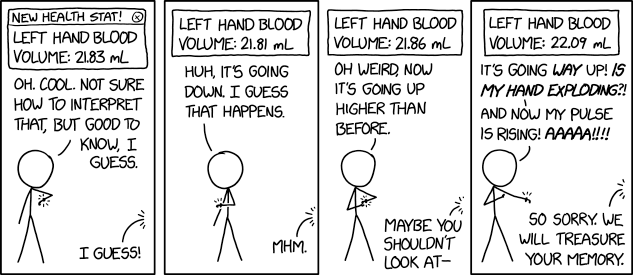February 16, 2022
Briefly
- Stats NZ had to take down NZ.Stat, one of the main public interfaces to official statistics. They’re being very helpful by email to people who need the data, but it’s a problem — and it’s not really the right interface for people who just wanted to look up a few numbers. Eric Crampton wrote about why this matters (feel free to ignore the comments about wellbeing indicators)
- The NZ Open Source Assocation awards include one to the Ministry of Health for the Covid trace app, and to the University of Auckland Computational Evolution group for their phylogenetic inference software, BEAST
- Measuring things you don’t have any real way to interpret, from XKCD

- “Creepiness” Is the Wrong Way to Think About Privacy from Slate. It’s a useful heuristic, but it’s not an analysis. As an illustration of how intuitions can be non-generalisable, the chair of George W. Bush’s bioethics council thought eating ice-cream in public was offensive.
- The power of selection bias: “In a series of tweets with an authentic February 7 timestamp, the self-described “industry insider working deep within Nintendo” showed an apparently deep foreknowledge of details that Nintendo wouldn’t officially reveal until the evening of February 9, two days later.”. He did it by making lots of predictions and then deleting all the ones that didn’t pan out.
- Tim Harford explains Arrow’s Impossibility Theorem: it’s hard to take a set of individual preferences and turn them into a group decision
Thomas Lumley (@tslumley) is Professor of Biostatistics at the University of Auckland. His research interests include semiparametric models, survey sampling, statistical computing, foundations of statistics, and whatever methodological problems his medical collaborators come up with. He also blogs at Biased and Inefficient See all posts by Thomas Lumley »